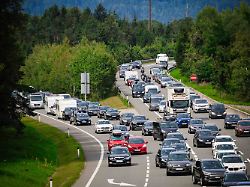Less travel on highways
Declining truck presence worries economists
September 8, 2023, 12:54 p.m
Listen to article
This audio version was artificially generated. More info | Send feedback
The German economy is not doing well. Economists are already predicting another recession for the third quarter. This is not only indicated by high inflation and rising interest rates – the low number of heavy trucks on German roads is also causing concern.
From an ecological point of view, a lower number of trucks on German roads is good news – but less so from an economic point of view. Truck traffic on German highways, which is considered an early indicator of economic developments, decreased in August. The mileage of toll trucks with at least four axles on federal highways fell by 0.8 percent compared to the previous month after calendar and season adjustments Federal Statistical Office announced. Compared to the same month last year, the truck toll mileage index even fell by 3.3 percent.
“For us, this number is another indication that the German economy will shrink in the third quarter,” said Commerzbank economist Ralph Solveen. “We have been assuming for some time that there will be no economic recovery in the second half of the year, but rather a new recession.” Gross domestic product stagnated in the second quarter. It had previously contracted twice in a row, which is why there is talk of a so-called technical recession.
Truck mileage on highways is closely monitored by economists: it provides very early information about current economic developments in industry, since economic activity also generates and requires transport services. There is a clear connection between the regional truck toll mileage and the sales in the manufacturing sector there, particularly in the industrially dominated countries. Production in industry, construction and utilities fell by 0.8 percent in July compared to the previous month, after minus 1.4 percent in June. “The reasons for the current weakness can certainly be seen primarily in the global tightening of monetary policy, which is slowing demand for German industrial goods at home and abroad,” said Solveen. Higher interest rates make investments more expensive.
Leading research institutes have recently lowered their forecasts for the German economy. The Essen-based RWI, for example, now expects a decline in gross domestic product of 0.6 percent this year. A slow global economy, increased interest rates, high inflation and an energy crisis – that is the current mix that is causing a lot of uncertainty among companies and consumers.
